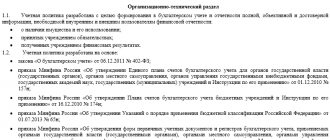Download a free example of an LLC accounting policy using the simplified tax system for 2022
As the initial sample, we chose the organization’s accounting policy - sample 2022 for an LLC operating in the catering industry and using the simplified tax system “Income minus expenses” (15%). Then we analyzed the proposed example of accounting policy for changes that come into force on 01/01/2022. The resulting result can be downloaded from the link.
In the Ready-made solution from ConsultantPlus, you can familiarize yourself with a sample accounting policy for a trading organization on the OSN; production organization at OSN. And to see the procedure for drawing up an accounting policy for VAT, refer to this Ready Solution. If you do not have access to K+, sign up for a trial demo access for free.
Settings for calculating production costs
This section of the UE settings establishes the calculated settings for the cost of production of products, semi-finished products, and services.
Using planned production costs. If the checkbox is checked during the month of the type of production, the product will be accounted for at planned prices and only at the end of the month its actual cost will be determined. In this case, the planned cost indicator can become the basis for the distribution of expenses.
Deviations from the planned cost are taken into account. If the checkbox is checked, account 40 “Output of products (works, services)” will be used to account for deviations from such costs.
The cost of semi-finished products is determined. This checkbox is checked to keep records of semi-finished products using account 21 “Semi-finished products of own production.”
The cost of services of your department is determined. If your company has divisions that provide services to other divisions, then you need to check this box. For example, repair services, transport services, boiler room services that provide heat and water to other departments, etc. These expenses are recorded in account 23 “Auxiliary production”.
When companies approve accounting policies
First, let's dispel the long-standing myth that accounting policies need to be approved annually. In fact, if there are no changes, then the adopted policy must be consistently applied from year to year - Art. 8 of the Law “On Accounting” dated December 6, 2011 No. 402-FZ.
The following deadlines apply for organizations regarding the development and approval of accounting policies:
| Situation | Accounting policy | |
| for used | for NU | |
| Creation of a new organization | Within no more than 90 days from the date of registration (clause 9 of PBU 1/2008, approved by order of the Ministry of Finance of Russia dated October 6, 2008 No. 106n) | No later than the end date of the organization’s first tax period (Clause 12, Article 167 of the Tax Code of the Russian Federation) |
| Making changes to accounting policies | As a general rule, a new accounting policy is approved in the current year and applied from the beginning of the next year (clauses 10, 12 of PBU 1/2008) |
|
| Making additions to accounting policies | At the moment when the additions became necessary (clause 10 of PBU 1/2008) | In the tax period when the changes became necessary (Article 313 of the Tax Code of the Russian Federation) |
NOTE! Changing and supplementing accounting policies are two different things! The changes entail the need for a retrospective recalculation of data for the years preceding the change in order to display in accordance with them incoming accounting balances and display data from previous years in mandatory accounting, while additions are needed primarily for the correct reflection of current accounting information.
Standards moving forward from 2022 (point by point)
The following provisions of the proposed example enterprise policy for accounting purposes have remained unchanged from previous years and continue to be applied consistently:
- preamble and paragraphs. 1–3, since the main regulatory documents, principles and assumptions for the formation of accounting policies have not changed;
- pp. 4, since the applied standards for accounting for inventories in these aspects have not changed;
- Clause 6, 19, 21 - inventory accounting in accordance with the new FSBU 5/2019 “Inventories”.
- How to apply the updated FSBU 5/2019 “Inventories” was explained in detail by ConsultantPlus experts. If you do not have access to the K+ system, get a trial online access for free.
- pp. 15-18, since it was decided not to change the rules set out in them regarding intangible assets;
- pp. 19, 20, because the procedure for accounting for special equipment and clothing used by the enterprise has not officially changed and is still relevant for accounting purposes;
- pp. 31–34, since the organization forms and discloses reserves for doubtful debts in the reporting for accounting purposes, and the applied procedure remains relevant;
- pp. 37–41, since the organization still does not apply some accounting provisions due to the specifics of its activities and the status of a small enterprise;
- pp. 42–44, since the current procedure for recognizing and correcting errors, as well as making changes to accounting policies remains relevant;
- pp. 46–47, 49-50, since the applied procedure and forms of document flow generally remain relevant;
The organization's document flow should be organized in accordance with the new FSBU 27/2021, which will become mandatory from 2022. ConsultantPlus experts explained in detail what the requirements are for the content and execution of primary accounting documents. Get trial demo access to the K+ system and upgrade to the Ready Solution for free.
- clause 51, since the special procedure for the inventory of certain accounting objects used by the organization remains relevant;
- pp. 52–62, since the organization continues to use the adopted organizational procedure in terms of signature rights, internal control, document flow and the declared ability to make changes to this accounting policy.
For a version of the document approving the accounting policy, see the article “Form of the order for approval of the accounting policy” .
The structure of the statement on the organization’s accounting policies
There are no mandatory requirements or instructions regarding the structure of the accounting policy statement, so before drawing it up, developers need to independently determine all the main structural components:
- sections, subsections, paragraphs and subparagraphs to be reflected in the accounting policy;
- the degree of detail of information when describing accounting and organizational nuances;
- a list of issues to be reflected in the accounting policy based on the specifics of the organization’s activities;
- selection from the above list of accounting algorithms that require separate registration in the form of applications, if they contain a detailed description and are independent in nature (for example, a method of separate VAT accounting).
ConsultantPlus experts explained in detail how to reflect the procedure for accounting for VAT in accounting policies. If you do not have access to the K+ system, get a trial demo access for free.
For information about which accounting and organizational issues are often separated into separate provisions, read the materials:
- “Regulations on business trips - sample”;
- “Regulations on remuneration of employees - sample”;
- “Regulations on incentive payments with performance criteria”.
Changes that need to be taken into account if accounting for 2022 is being formed (item by item)
In the proposed example of an enterprise’s accounting policy for 2022, the following have been changed (added):
- pp. 7-14 because the applicable standards for fixed assets and capital investments must be maintained in accordance with the new FAS 6/2020 “Fixed assets” and 26/2020 “Capital investments”
Find out how an organization can switch to accounting for fixed assets and capital investments in accordance with FAS 6/2020 and FAS 26/2020 in ConsultantPlus. Get trial demo access to the K+ system and switch to the Ready Solution for free.
- Clause 48 - it includes an indication of the approval of mandatory requirements for the preparation of primary accounting documents. Let us remind you that as of June 9, 2019, the chief accountant cannot be fined for errors made in accounting due to the fault of third parties, including due to their incorrect preparation of primary documents. And from July 26, 2019, the Law “On Accounting” introduced an indication of mandatory compliance with the requirements of the chief accountant (another person responsible for accounting) for registration of primary accounts by all employees of the organization. In this regard, it is recommended to draw up such written requirements as an appendix to the accounting policy and familiarize them with all employees involved in working with documentation, against signature.
In accounting
Economic entities in their accounting policies for accounting purposes reflect provisions that disclose accounting methods and industry specifics.
Regardless of the type of activity, organizations claim:
- working chart of accounts and forms of primary documents;
- a method of controlling the procurement, acquisition and write-off of inventories;
- method of calculating depreciation;
- error correction procedure.
Trade organizations indicate the method of reflecting transportation and procurement costs - in the cost of the goods or as they are sold.
Retail trade organizations indicate the method of accounting for goods - at purchase prices without markup.
Organizations with a long production cycle indicate the method of recognizing income as work, services, and products are ready.
IMPORTANT!
From 2022, the mandatory application of the FSB begins:
- 25/2018 “Lease Accounting”;
- 6/2020 “Fixed assets”;
- 26/2020 “Capital investments”;
- 27/2021 “Documents and document flow in accounting.”
Be sure to specify the rules for their application in the accounting policy. Check the provisions related to the application of FSB 5/2019, the obligation to apply which began in 2021.
Provisions not included in the finished document
Due to the fact that these areas of activity and accounting objects are not involved in any way in the activities of a particular enterprise, this accounting policy does not disclose the following procedures:
- recognition of revenue for work (services) with a long cycle (clause 13 of PBU 9/99, approved by Order of the Ministry of Finance of Russia dated May 6, 1999 No. 32n);
- recalculation and presentation in reporting of items denominated in foreign currency (clauses 6, 7 of PBU 3/2006, approved by order of the Ministry of Finance of Russia dated November 27, 2006 No. 154n);
- accounting for budget financing and other targeted financing (PBU 13/2000, approved by order of the Ministry of Finance of Russia dated October 16, 2000 No. 92n);
- accounting for R&D (PBU 17/02, approved by order of the Ministry of Finance of Russia dated November 19, 2002 No. 115n);
- accounting of financial investments (PBU 19/02, approved by order of the Ministry of Finance of Russia dated December 10, 2002 No. 126n).
For information on what aspects you should pay attention to if an enterprise is also developing a policy for management accounting, read the article “Accounting policies for management accounting purposes .
In tax accounting
Depending on the applied tax regime, the accounting policy considers the following issues:
- income recognition method for calculating income tax: cash or accrual;
- method for determining the cost of write-off of materials and goods: by unit cost, weighted average or FIFO method - by the cost of the first purchases;
- method of calculating depreciation of fixed assets and intangible assets: linear or non-linear;
- the possibility of accruing reserves to regulate income tax: for doubtful debts for vacation pay, for warranty repairs and repairs of fixed assets;
- tax register form for calculating the taxable base: book of income and expenses, book of sales and book of purchases, independently developed registers.
Read more: about the formation of accounting policies for tax purposes
Results
A ready-made accounting policy has a set of aspects characteristic of the organization for which it was drawn up. Using a ready-made document from another enterprise as a sample for preparing an accounting policy, you should compare and adjust the provisions for each item. And also take into account those provisions that may not be used (not disclosed) in the accounting policies of one enterprise, but should be included in a similar document of another.
You can find more complete information on the topic in ConsultantPlus. Free trial access to the system for 2 days.
Common Questions
How to reflect electronic document flow with the counterparty in the accounting policy?
In your accounting policy, you need to specify the procedure for using electronic document management with counterparties if you plan to use it. In the general section of the accounting policy, it is logical to establish the basic rules for electronic document management with counterparties (in what cases, under what conditions and in what order is it applied).
It can be formulated as follows: “The exchange of electronic documents is carried out via TCS using an enhanced qualified electronic signature of persons authorized by order of the General Director, through an electronic document management operator.”
Establish detailed procedures for electronic document management in a special section. For example, if you plan to use it when issuing invoices, you can include the following rule in your accounting policy:
“Issuing invoices is carried out electronically via telecommunication channels using the UKEP of an authorized person through electronic document management operators that ensure the exchange of documents in electronic form via telecommunication channels, in the Procedure approved by Order of the Ministry of Finance of Russia dated 02/05/2021 No. 14n.”
Read more about organizing electronic document flow in an organization here.
Is it possible to be held liable for the lack of accounting policies?
Can. For the absence of the document itself, you will be fined 200 rubles. the organization itself and 300-500 rubles. - official (Article 15.6 of the Administrative Code).
But the accounting policy, in addition to the accounting procedure, establishes the forms of tax registers at the enterprise, and also describes the procedure for maintaining tax accounting. If the tax authorities prove the absence of tax registers, they will issue a fine of 10 thousand rubles. (30 thousand rubles - if the violation was committed more than one tax period).
If, due to a violation, the tax base is underestimated, then the fine will be 20% of the amount of unpaid tax, but not less than 40 thousand rubles. (Article 120 of the Tax Code of the Russian Federation).
How to approve changes in accounting policies?
Changes to accounting policies can only be made from the beginning of the new year or in the event of new regulations that come into force in the middle of the year.
For details, see the material “When and how a change in accounting policy should be introduced.”
A description of the rules for accounting for objects or transactions that you did not have before is considered not a change, but an addition to the accounting policy. Additions can be made at any time, and applied immediately after approval (clause 10 of PBU 1/2008).
You can find more complete information on the topic in ConsultantPlus. Free trial access to the system for 2 days.





